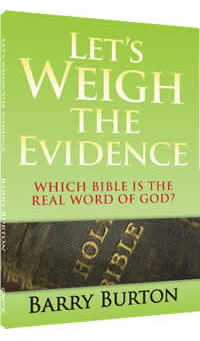Is Trust in the Bible Important?
Issue Date: January/February 2007
A recent issue of a national Christian magazine carried an article about a young man who lost faith in the Bible while in Bible school and now considers himself a "happy agnostic." How did this happen? He began to read the Greek. The problem was that he read the wrong Greek. It was the Greek that was the source of the modern perversions instead of the "other Greek" that was used by the translators of the King James Version.
As a teen, he was led to accept Christ by a Youth for Christ leader. He went on to excel at Moody Bible Institute. There he was taught that we don`t have a reliable Bible; that the only New Testament with no errors was the original texts, the "autographs." He was told that the "copies of copies" that we have now were "filled with copyists` errors," both accidental and intentional.
Further study of "textual criticism" of the "Greek" only added to his struggle. He says, "I kept reverting to my basic question: How does it help us to say that the Bible is the inerrant word of God if in fact we don`t have the words that God inerrantly inspired?" Finally, he gave up on the whole thing and became what he describes as a "happy agnostic." He now describes his understanding of life after death: "I think you just cease to exist, like the mosquito that you swatted yesterday."
This is exactly the dilemma that author David Daniels speaks to in his book, Did the Catholic Church Give Us the Bible? He points out that there are really TWO Bibles originating from two streams of "Greek" manuscripts. One of these streams is polluted with the copying errors that tripped up our "happy agnostic." He was only told about one of these Bible streams. And when he dug into the Greek manuscripts behind that Bible, he found so much pollution that it destroyed his faith.
A hundred years from now he will realize that he has not ceased to exist, but has been the victim of one of Satan`s most clever and dangerous deceptions. "Believers are totally in the dark over this issue," says Daniels, "because the truth has been clouded over."
He points out that faithful copies were made of the original texts that are totally accurate and reliable. Moses even had to work with a copy of the Ten Commandments because he broke the "originals." Jesus and Paul and the other apostles obviously relied on the Old Testament copies in their preaching and writing.
When the Hebrew scribes copied the Old Testament, they were so careful that even today there is little question as to its accuracy.
In the same way, that other stream of "Greek" (and Latin, and German, and English) manuscripts were just as carefully copied and translated. Ultimately they were used to prepare the King James Version. Had our "happy agnostic" been told of this other "Greek," he might have kept his faith and not be in for such a surprise on judgment day.
God DID preserve His Words for us today. Author Daniels proves that we can rely on the KJV as a faithful, true copy of what was in the "original" manuscripts. How sad that our "happy agnostic" was not told that there was a Bible that he could fully trust: the King James Bible—God`s preserved words in English.
- See more articles on related topics:
- Bible Versions
- King James Bible
- Two Types of Bible Versions
- History of Preservation
Other Articles from January/February 2007:
- A Message From Jack Chick
- Getting Ready to Leave?
- My Teacher Got Saved - Became A Pastor
- Prison Ministry Letters: Jan-2007
- Where's the Trash?
- Tracts Plus Web Site Equals More Ways to Witness
- You Probably Know This Woman!
- New KJV Workbook Helps Clarify Bible Versions Issue
- Missionary Finds Africa 'Wide Open' to the Gospel
More on Bible Versions:
Products of Interest:
-

Why the KJV Bible is the Perfect Word of God.
48 pages
This unique five-lesson Bible study workbook builds people's faith in God's Word, the 1611 King James Bible. Great for home groups, Sunday School classes, and new converts. -

Let's Weigh the Evidence
96 pages
In simple language, this book provides the basics of the Bible version issue, showing why the King James is the only Bible you can trust. Compare the solid history of the King James Bible with the new Bibles that remove Christ’s Virgin Birth and His Second Coming. Learn about Westcott and Hort’s bait-and-switch, missing verses and words, the Living Bible’s tampering, copyright issues, and more! -

Did the Catholic Church Give Us the Bible?
208 pages
The Bible has two histories. One is of God preserving His words through His people. The other is of the devil using Roman Catholic "scholars" to pervert God’s words and give us corrupt modern Bibles.



